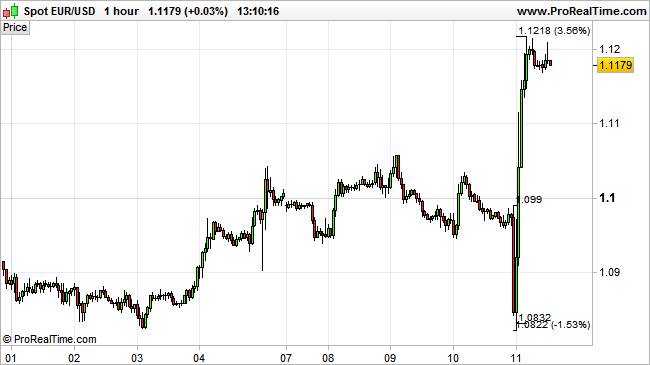What was the ECB thinking?
Published 11-MAR-2016 15:26 P.M.
|
4 minute read
Hey! Looks like you have stumbled on the section of our website where we have archived articles from our old business model.
In 2019 the original founding team returned to run Next Investors, we changed our business model to only write about stocks we carefully research and are invested in for the long term.
The below articles were written under our previous business model. We have kept these articles online here for your reference.
Our new mission is to build a high performing ASX micro cap investment portfolio and share our research, analysis and investment strategy with our readers.
Click Here to View Latest Articles
The ECB will do the unthinkable following the latest interest rate decision announced yesterday in the European trading hours.
Europe’s central bank, responsible for setting monetary policy across 19 euro-area member countries has announced that it will cut the base interest rate to zero, the deposit rate to -0.4% and most surprisingly of all, will follow the Bank of Japan (BoJ) into buying corporate bonds as part of its quantitative easing (QE) program.
The ECB said that the deposit facility rate was being cut by 10bps to -0.4%, the lending facility was lowered by 5bps to 0.25% and a new series of long-term loans to banks were also announced.
On top of that, ECB President Mario Draghi announced a new four-year loan program that potentially allows banks to be remunerated for taking the ECB’s money if they expand credit to the real economy, in a quartet of operations stretching to 2021.
In other words, banks will be paid even more to write loans to people that cannot afford them; with money they themselves do not have.
Yesterday’s ECB decision was denounced as “The greatest redistribution of wealth in Europe since World War II” by Germany’s leading financial daily newspaper, Handelsblatt.
ECB market reaction
The news sent shockwaves around all financial markets globally and sparked severe price tilts in currencies, commodities and equity indices. The Euro experienced daily price reversals not seen since 2011, a period dominated by the Greek credit crisis that undermined confidence in the broad EU federal model.
Immediately after yesterday’s ECB announcement, the Euro fell 1.52% from $1.10 against the US dollar to 1.0822. Within a few hours however, the Euro had rallied by 3.56% to stand at $1.1218 – significantly higher than the Euro’s pre-ECB level.

Market analysts and traders were startled to see such volatility and unpredictability in market sentiment.
On the surface, stronger QE measures indicate a negative outlook for the Euro which explains the initial 1.53% decline. The Euro’s strong rally in the hours following the ECB announcement remains unexplained with some suggesting that the ECB’s actions had effectively put a floor under speculation that the ECB was losing control of its mandate and market confidence.
Another possibility, is that the ECB conducted market operations of its own and initiated Euro buying specifically against the major currencies such as the US dollar, Yen and Swiss franc, as a way to arrest the Euro’s decline and ward of market speculators.
As the bloodbath in currencies ensued, equity indices were in cheerful mood buoyed by the prospect of cheaper capital from the ECB. All European indices were higher on the news.
Developing countries also saw strong buying interest as risk aversion dissipated from previously uncertain markets. The MSCI Emerging Market Index of equities added 0.4% within 25 minutes of ECB’s decision.
However, the cheer didn’t last long as European equity markets closed the day broadly lower with the DAX (Germany’s benchmark index) falling 2.06% and CAC shedding 1.85%. US, UK and Asian markets closed their sessions broadly lower.
Digging deeper
The ECB’s deposit rate is the rate the ECB pays banks to leave money with it overnight. Now standing at -0.4% it means banks have to pay money to leave deposits with the ECB – something the central bank hopes will stir the big lenders to invest capital into the economy, rather than continually hoarding it thereby forcing savers to go out and spend or invest their money.
Or so the theory goes.
Negative interest rates in Japan, Switzerland and part of Scandinavia have not induced higher inflation or broader GDP growth in those countries.
In fact, countries that have been the biggest adopters of QE (Japan, US, China, Switzerland, UK) have experienced some of the lowest inflation and GDP rates when compared to other developed countries.
Crossing the Rubicon
The decision to add at least another €20 billion to monthly asset purchases remains the key issue however. The ECB has taken the unprecedented step of meddling in private assets by announcing bond buyback programs for corporate debt – which historically, has only served to distort and warp market valuations and investor sentiment, rather than invigorate them.
Should central banks be buying private assets to help prop up equity indices, bond markets and corporate balance sheets?
If the answer is yes, that means central banks are gradually becoming the central planners of today’s global command economy because central banks are known to think and act in unison.
If the answer is no, then the past 10 years of monetary policy in the developed world (G20) has been going in the opposite direction to its stated destination goals.

Mario Draghi pictured in Germany’s leading financial daily ‘Handelsblatt’
Forty-two days ago, Mario Draghi said there were “no limits” to what the ECB was willing to do in order to reach its mandated 2% inflation target. He hinted that the ECB had the “power, willingness and determination” to take action in March if needs be.
This month’s action comes as inflation stands at -0.2% m/m, the first negative reading in five months.
In a research note earlier published earlier this week, Deutsche Bank asked the question ‘Is today’s the most challenging central bank meeting in living memory?’
The answer is yes because the ECB is now backed into a zero interest rate corner with negative rates already being priced in by futures markets. QE is also on the way up – while asset prices remain anemic and continue to threaten sharp declines at the mere whiff of higher interest rates.
General Information Only
S3 Consortium Pty Ltd (S3, ‘we’, ‘us’, ‘our’) (CAR No. 433913) is a corporate authorised representative of LeMessurier Securities Pty Ltd (AFSL No. 296877). The information contained in this article is general information and is for informational purposes only. Any advice is general advice only. Any advice contained in this article does not constitute personal advice and S3 has not taken into consideration your personal objectives, financial situation or needs. Please seek your own independent professional advice before making any financial investment decision. Those persons acting upon information contained in this article do so entirely at their own risk.
Conflicts of Interest Notice
S3 and its associated entities may hold investments in companies featured in its articles, including through being paid in the securities of the companies we provide commentary on. We disclose the securities held in relation to a particular company that we provide commentary on. Refer to our Disclosure Policy for information on our self-imposed trading blackouts, hold conditions and de-risking (sell conditions) which seek to mitigate against any potential conflicts of interest.
Publication Notice and Disclaimer
The information contained in this article is current as at the publication date. At the time of publishing, the information contained in this article is based on sources which are available in the public domain that we consider to be reliable, and our own analysis of those sources. The views of the author may not reflect the views of the AFSL holder. Any decision by you to purchase securities in the companies featured in this article should be done so after you have sought your own independent professional advice regarding this information and made your own inquiries as to the validity of any information in this article.
Any forward-looking statements contained in this article are not guarantees or predictions of future performance, and involve known and unknown risks, uncertainties and other factors, many of which are beyond our control, and which may cause actual results or performance of companies featured to differ materially from those expressed in the statements contained in this article. S3 cannot and does not give any assurance that the results or performance expressed or implied by any forward-looking statements contained in this article will actually occur and readers are cautioned not to put undue reliance on forward-looking statements.
This article may include references to our past investing performance. Past performance is not a reliable indicator of our future investing performance.
